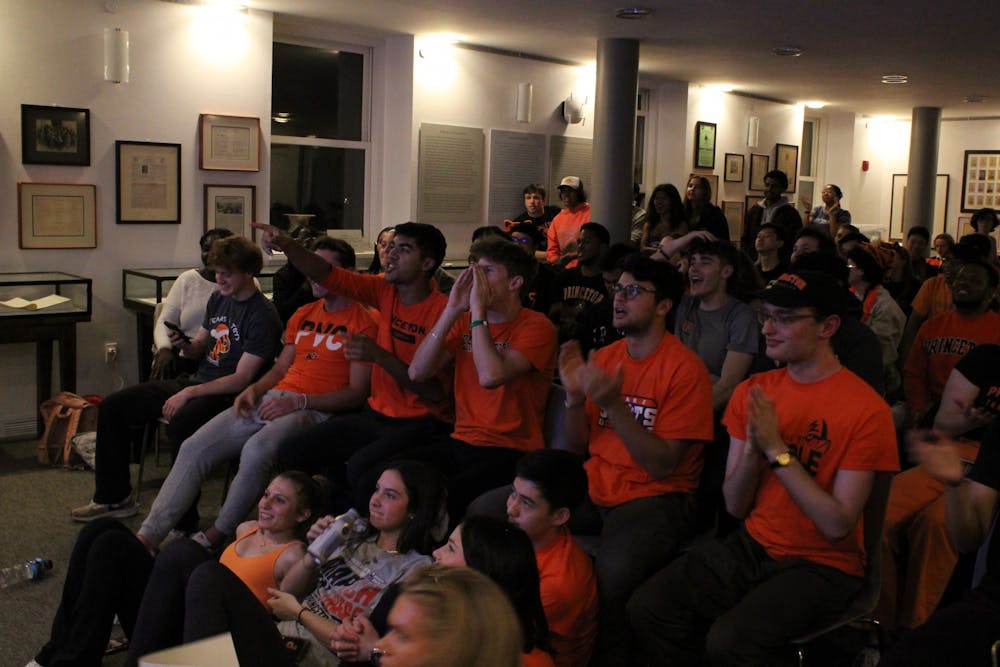This week, the Princeton men’s basketball team returns from a historic March Madness run, losing to Creighton in their first Sweet 16 appearance since the tournament expanded to 64 teams in 1985.
The team pulled off two upsets to get there, a source of major surprise for many devoted watchers. James Antony, a C.V. Starr Fellow at the Princeton Neuroscience Institute (PNI), has been studying this very phenomenon: the unpredictability of basketball games.
On Nov. 29, 2020, Antony and other researchers at the University published a paper showing that the human experience of witnessing basketball games that defy our expectations corresponds to unique neural, behavioral, and physiological markers. As the University community continues to celebrate the Tigers’ early victories and process their ultimate loss, these findings shed light on how the brain behaves.
The study revolved around observations of 20 self-identified basketball fans as they witnessed the final minutes of nine games from the 2012 March Madness tournament. While watching these games unfold at pivotal moments, subjects’ eye movements and pupil dilation were monitored using specialized cameras. Their brain activity was also tracked with functional magnetic resonance imaging (fMRI).
The study was based on a hypothesis termed Event Segmentation Theory (EST), which argues that humans segment their continuous experiences into internal event models that are used to predict future events.
“Although we experience the world continuously, we tend to divide it up into distinct events when we think back in memory,” Antony explained in a written statement to The Daily Princetonian. “So, what determines when we segment events, and how is this predicted by brain and eye patterns?”
According to Antony, the study found that more surprising plays “increased the likelihood that participants segmented events.” These unexpected outcomes also manifest as a variety of physiological changes and neural cues.
“In the eyes, greater surprise increased pupil dilation,” he wrote. “[I]n the brain ... greater surprise resulted in greater changes in neural event patterns — as if our brains more strongly updated their internal frame of mind when the context of the game shifted.”

Overall, the study’s results favored the EST theory, including findings of internal event segmentations, enhanced pupil dilation, and an increased probability of neural representational shifts in response to subjective assessments of surprise events that occurred in the basketball games subjects watched.
Most notably, the study found that “belief-inconsistent surprise” — defined as surprises that contradict one’s beliefs and introduce greater levels of uncertainty — served as a far more reliable indicator of subjective event boundaries than “belief-constant surprises” or surprises that align with one’s preferences and minimize uncertainty.
“We found that not all forms of surprise are created equal,” wrote Antony. Generally, he reported, surprises that were perceived to influence the final outcome of the game (moving win probability closer to 50 percent than 100 percent for the team currently winning) increased observed differences in brain patterns.
Based on the insights of Antony’s study, in the context of the Princeton men’s basketball team’s unforeseen winning streak, it would be predicted that most spectators watching these games would experience greater segmentation in subjective event models, increased pupil dilation, greater reward system activation, and pronounced neural state changes in higher-order cortical regions like the precuneus and medial prefrontal cortex.

However, Antony stressed that this interpretation holds true only for basketball fans who doubted the Tigers’ ability to trounce their opponents.
“For most fans around the [United States], we would predict each of those things. But for true Princeton fans who expected them to win all along, their surprise as Princeton pulled ahead might be much lower!” wrote Antony.
The original study was published in the journal Neuron on January 20, 2021.
Amy Ciceu is a senior News writer who covers research and COVID-19-related developments.
Please direct any corrections requests to corrections[at]dailyprincetonian.com.








